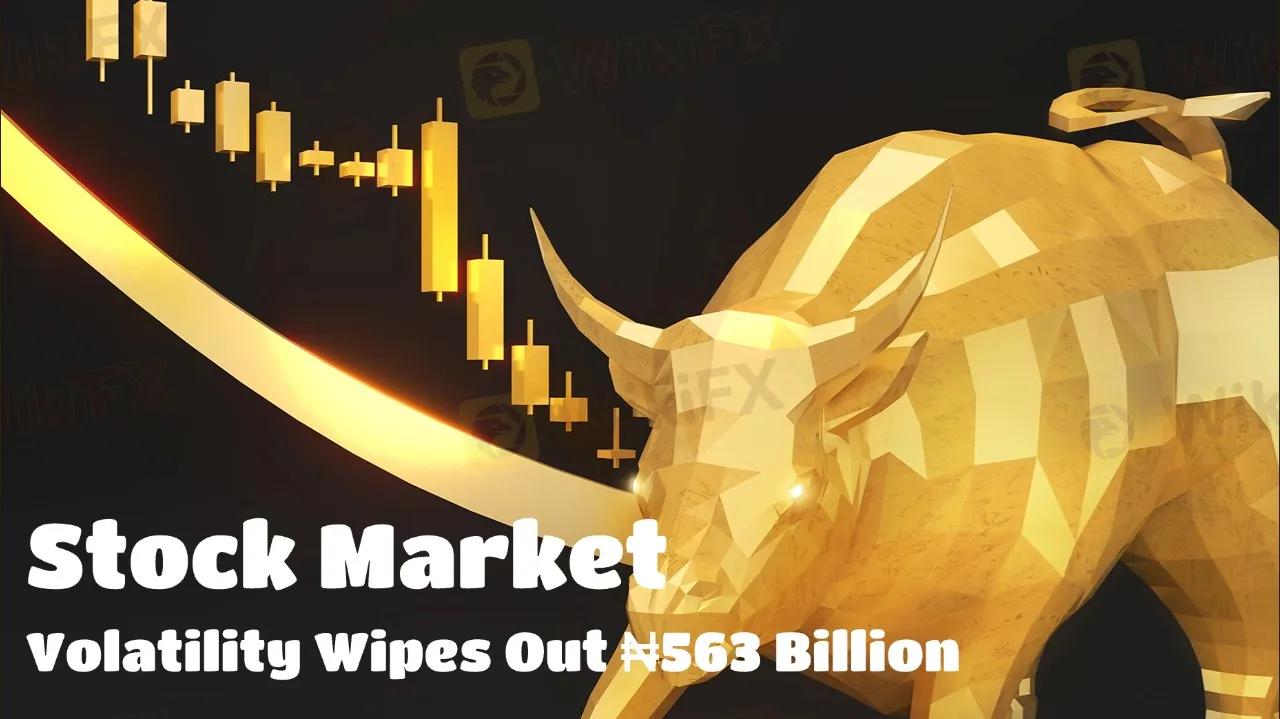简体中文
繁體中文
English
Pусский
日本語
ภาษาไทย
Tiếng Việt
Bahasa Indonesia
Español
हिन्दी
Filippiiniläinen
Français
Deutsch
Português
Türkçe
한국어
العربية
Stock Market Volatility Wipes Out ₦563 Billion
Abstract:With continued declines and a surge in sell-offs, the Nigerian stock market has lost ₦563 billion in market value this week.

The Nigerian stock market faced ongoing pressure this week, with a 0.44% drop on Wednesday marking the third consecutive day of losses. The market value fell from ₦66.352 trillion to ₦65.79 trillion, erasing about ₦563 billion.
MRS Oil Nigeria Plc was the major drag, plummeting nearly 9%, contributing significantly to the overall market decline. Other stocks, such as Livestock Feeds, eTranzact, and Coronation Insurance, also saw steep declines, leaving the market in a generally pessimistic mood.
The market downturn was primarily driven by large-cap stocks facing sustained sell-offs. Stocks like MRS Oil, Transcorp, and Oando saw continued weakness, triggering bearish sentiment. Furthermore, the lack of positive news and economic uncertainty weakened investor confidence, with little buying interest at lower levels.
Analysts generally remain cautious about the short-term market outlook, with selling pressure continuing to dominate trading.
Looking ahead, the Nigerian stock market faces both external uncertainties and weak internal fundamentals. While some individual stocks like Julius Berger and Wema Bank showed modest rebounds, the broader market remains in a weak state.
The market will continue to focus on economic data, policy signals, and global market developments to assess whether the market can stabilize. Until then, volatility is likely to persist, and investors need to stay vigilant.

Disclaimer:
The views in this article only represent the author's personal views, and do not constitute investment advice on this platform. This platform does not guarantee the accuracy, completeness and timeliness of the information in the article, and will not be liable for any loss caused by the use of or reliance on the information in the article.
Read more

TradeHall vs. HYCM: Which Broker Should You Choose?
When choosing a broker, understanding the difference between superficial features and real regulatory protection is essential. In this article, WikiFX will compare TradeHall and HYCM. While on the surface, both brokers offer a wide range of trading instruments, the real difference lies in their regulatory statuses, which is a commonly overlooked factor for traders when they opt for brokers.

Trade Nation vs. FBS: Which Broker Is Better for New Traders?
If you're new to trading, choosing the right broker can feel overwhelming. Two popular choices, Trade Nation and FBS, offer very different experiences. This comparison breaks down which is better suited for beginners, based on ease of use, safety, costs, and support.

Exness Acquires €75 Million Property in Cyprus for Future Growth
Exness, a leading forex trading broker, has purchased a €75 million property in Cyprus, securing 200,000 square meters for expansion, including potential employee housing or a new campus.

WikiFX’s Complimentary Protection Services Aim to Safeguard Investors' Legal Rights and Interests
Amid the increasingly complex forex market environment, WikiFX remains steadfast in its mission to provide global users with free, professional, and authentic forex rights protection support services.
WikiFX Broker
Latest News
Danske Bank expects the European Central Bank to make its final interest rate cut in September.
Retirement Dreams Shattered: Don't Do This To Yourself!
EU Regulators Imposed Over €71M in Sanctions in 2024, ESMA Calls for Enforcement Convergence
No Regulation, Revoked Licence: Is Tradehall Safe to Use?
Philippines Sets Southeast Asia’s First Crypto Regulatory Framework
Tether Freezes $12.3 Million in USDT Over Money Laundering Concerns
MiCA Unlocks EU Crypto Market, but National Tensions Rise as Gemini and Coinbase Near Approval
FortuixAgent Review 2025: Is it Scam or Legit?
MetaTrader Support Ending July 2025: Update Now or Risk Losing Access
HYCM Broker Review 2025: A Comprehensive Overview
Currency Calculator


